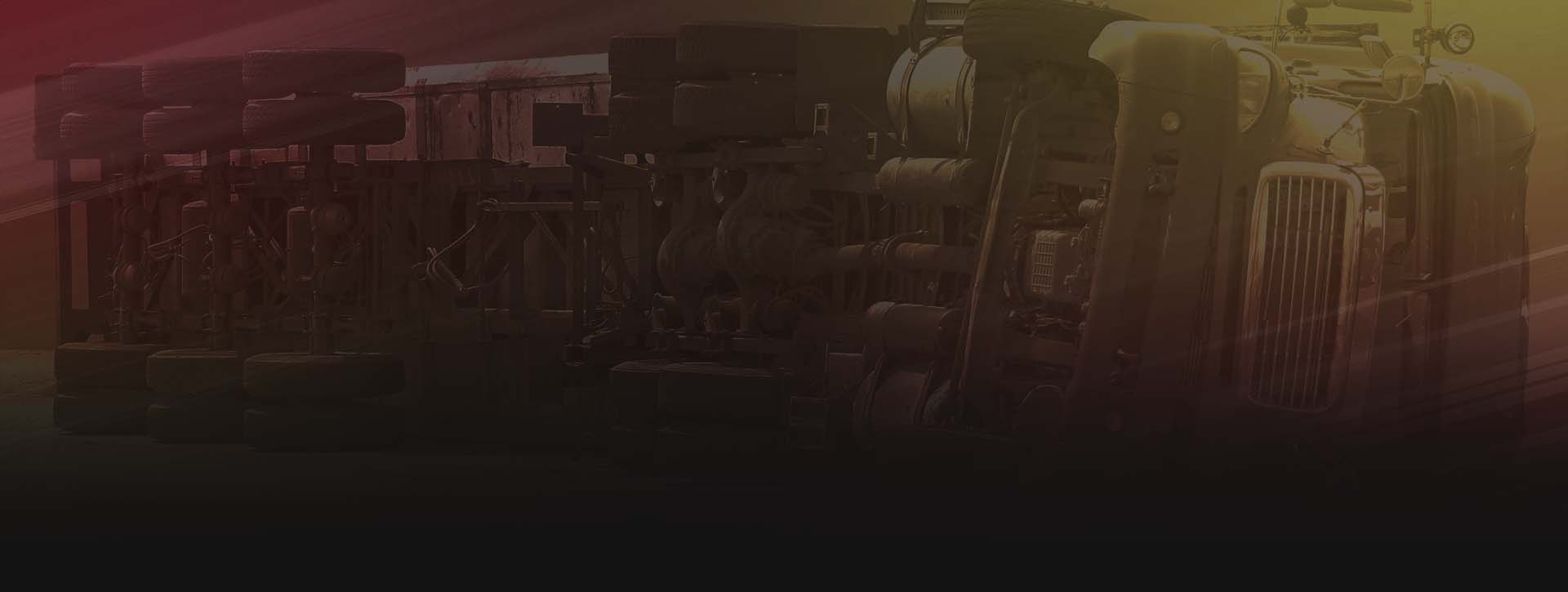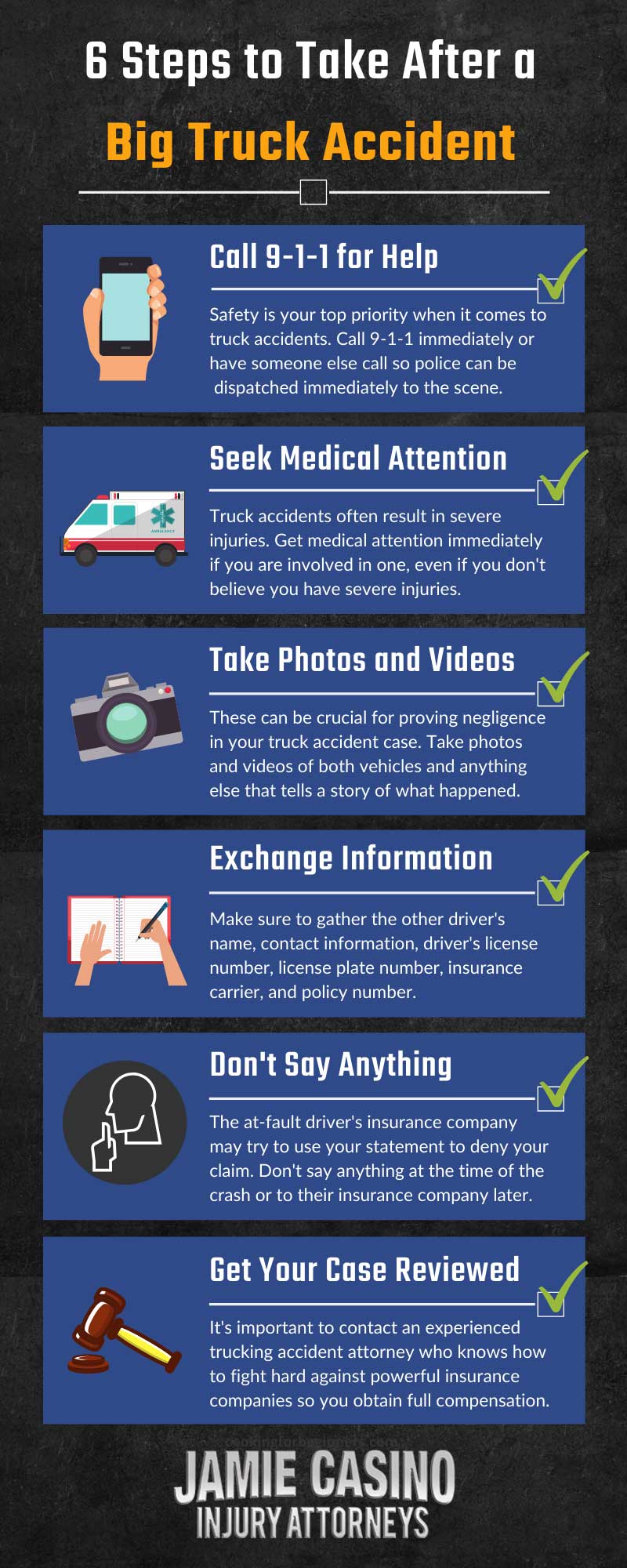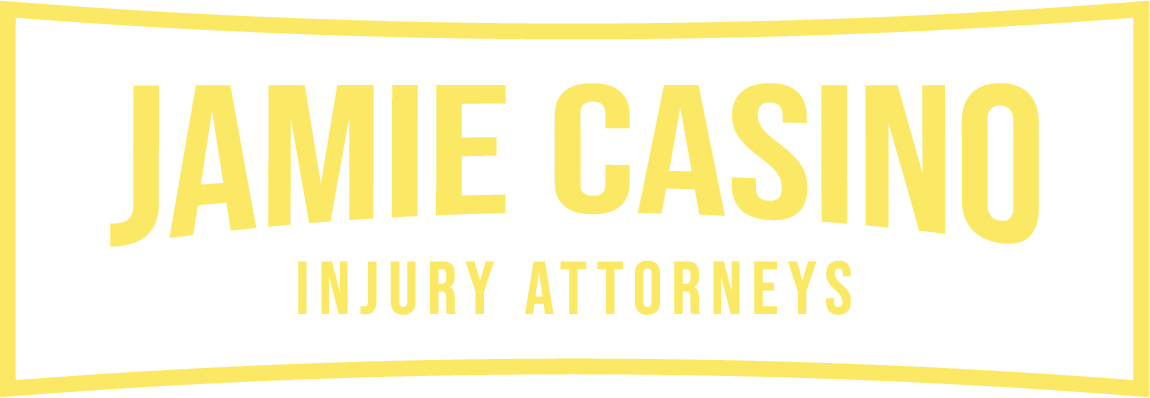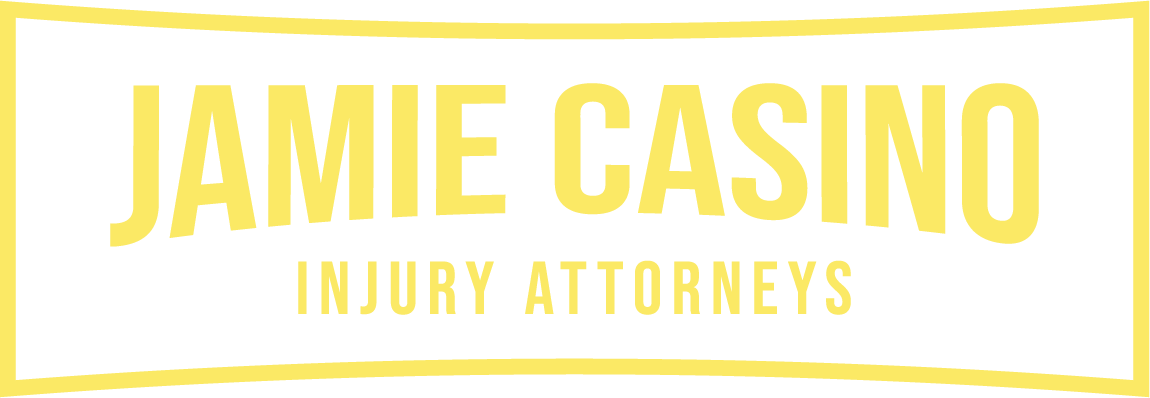
Savannah Truck Accident Lawyers
Our Team Has Scored Record Results in the Courtroom
Fill Out a Form | Call Us | Testimonials
If you are seriously injured in a truck accident, you will most likely be forced down a fast-moving road of injustice. Trust us; you want to take this road with a skilled legal team. You need a law firm that has stood up for countless personal injury victims against those insurance company bullies.
In 2018, Georgia saw 187 fatalities due to truck accidents. When you turn to Jamie Casino Injury Attorneys, we can help you get the medical care and settlement you deserve. Our Savannah truck accident attorneys have recovered millions on behalf of our injured clients.
Information on this page:
- Liability in Truck Accidents
- Investigating Your Truck Accident Claim
- Different Forms of Truck Accidents
- What are the Common Causes of Truck Accidents?
- Why are Trucking Accidents Unique?
- What to Do If an Insurance Company Contacts You
- Truck Driver Regulations
- What is a Large Truck?
- Are There Other Types of Large Trucks?
- How long do I have to file?
- How much is my case worth?
- Why You Should Always Get the Help of a Lawyer
- Find Related Articles
If you did not find the answer to you question about your accident, please contact us.
Liability in Truck Accidents
Unlike in car collisions, several parties can be held responsible for the injuries and damages you have incurred in a big truck accident.
Potentially liable parties include:
- The truck driver: If a driver is an independent contractor of the company, they are driving for they are often held liable in an accident. Additionally, if the truck driver was acting negligently or breaking the law, they may be held liable.
- The trucking company: Since employers are responsible for their employee’s actions while they are at work a trucking company may be held liable. Companies can also be the ones encouraging their employees to break FMCSA regulations in which case they can be held responsible for an accident.
- The company using the truck to ship materials: Likewise a company using the truck, even if they are not the owner, can be held liable for an accident.
- The truck’s maintenance provider: If a maintenance provider makes a mistake or fails to address certain issues that leads to an accident they can be held liable.
Depending on the circumstances of your accident, one or more of these entities can be held liable for the damage you suffered. However, proving liability is rarely an easy task. Insurance companies will take immediate action to limit liability. That’s why it is crucial that you seek experienced legal counsel as soon as possible after a crash.
Investigating Your Truck Accident Claim
Truck accident cases can be very complex; it is not always immediately clear exactly what happened or which factors led to the accident. This is why it is so important that your attorney knows how to properly conduct an independent investigation into the accident. The investigation allows your attorney to uncover how the accident occurred and, most importantly, which party/parties are liable.
At Jamie Casino Injury Attorneys, we thoroughly investigate all truck accident claims. Our Savannah truck accident lawyers will look at a variety of factors to determine what happened and whether the accident could have (and should have) been prevented.
Depending on the specific circumstances of your situation, our investigation of your truck accident claim may include any of the following:
- Reviewing the truck’s cab video to determine whether the truck driver was distracted, falling asleep at the wheel, or otherwise acting negligently
- Acquiring access to the vehicle’s event data recorder (EDR), or “black box,” which records issues with the truck, such as changes in engine function or tire speed.
- Going over the driver’s hours-of-service logs to determine if the driver observed all legally required rest breaks and maximum drive times.
- Viewing personnel and dispatch records to determine whether there were any issues with the driver’s employment, as well as view the truck’s route, communications, and other details.
- Access the truck maintenance records to assess whether proper maintenance procedures were followed or whether maintenance/repair work was neglected.
- Review records regarding the type of cargo the driver was transporting, as well as how that cargo was handled (or mishandled).
- Reviewing evidence from the scene of the accident, including tire skid marks, debris distribution and location, damage to surrounding infrastructure, footage from nearby security cameras, etc.
- Obtaining statements from relevant parties, including the truck driver, dispatcher, cargo handlers, and other trucking company employees and third parties.
- Investigating the truck driver’s cell phone records to determine whether he or she was using a cell phone (evidence of distracted driving) at the time of the crash.
- Examining physical evidence taken from the scene of the crash, including your vehicle and the truck involved to assess damage.
- Reviewing truck/truck part recalls to determine whether the vehicle or a truck part had been recalled, which may indicate that a defective product caused the crash.
By investigating these and other aspects of your case, we are able to better understand such things as how fast the truck was traveling when the accident occurred, the angle at which the impact occurred, whether or not the brake was applied in time, and other relevant factors involved in the collision. All of this allows us to build a solid case with factual, supporting evidence on your behalf.
Different Forms of Truck Accidents
Truck accidents come in many different types, each caused by a unique set of circumstances and mistakes. We can thoroughly investigate the details of your crash to determine why the accident occurred, which is the first step in assigning liability. Throughout our many years of legal experience, our Savannah truck accident attorneys have seen all sorts of truck accident cases, so you can be sure that we will not be thrown off balance by the details of your claim, no matter how unusual or jarring the accident type involved.
Four common types of truck accidents are:
- Jackknife: If a truck driver slams on the brakes suddenly or takes a turn too sharply, the big rig can jackknife, which means it folds at the hinge between the tractor and the trailer. Jackknife accidents endanger vehicles in all lanes as the trailer swings so widely that it eventually surpasses the tractor, making the entire vehicle look like a partially folded jackknife.
- Rollover: Commercial trucks with top-heavy cargo are at risk of a rollover accident when turning or weaving in and out of lanes. The large side of a trailer can also be struck by gale force winds, catching it like a sail. Depending on the weight of the trailer and its load distribution, the wind can tip the entire thing over, possibly crushing cars in the adjacent lane.
- Rear-end collision: Brake failures and truck driver exhaustion are two persistent problems with the trucking industry, which often culminate in rear-end collisions. Some of the worst truck accidents on record involve a big rig slamming into stopped traffic at full speed because the trucker was not paying attention or the vehicle’s brakes gave out.
- Underride: When a smaller vehicle gets caught underneath the trailer of a semi-truck, it is called an underride accident, which can crush the car and catastrophically injure anyone inside. Underride accidents can occur when the truck driver does not check carefully enough for smaller vehicles in adjacent lanes before turning, merging, or changing lanes.
- Rollover Accidents: Rollover accidents involve the truck tipping onto its side or rolling over completely. These accidents can be caused by factors such as speeding, sharp turns, uneven road surfaces, or improperly loaded cargo.
- Blind Spot Accidents: Trucks have large blind spots, especially on their sides and rear. When a truck driver fails to check these blind spots or properly signal before changing lanes or making turns, it can lead to collisions with other vehicles.
- Wide Turn Accidents: Trucks require a wide turning radius, and drivers may not always account for this when making turns. As a result, they might swing wide, colliding with vehicles, pedestrians, or objects in their path.
- Cargo Spills: Improperly secured cargo can shift or fall off a truck, leading to accidents and road hazards. Cargo spills can cause secondary accidents and pose environmental risks, especially if the cargo includes hazardous materials.
- Tire Blowouts: Truck tires can blow out due to factors like overloading, poor maintenance, or road hazards. A tire blowout can cause the driver to lose control of the vehicle, potentially resulting in a collision.
What are the Common Causes of Truck Accidents?
Truck accidents on our roads are common, and unfortunately, can be deadly. Knowing the common causes of these truck accidents can help us better prepare for potentially hazardous situations. The common causes tend to involve:
- Driver fatigue
- Driving under the influence of drugs or alcohol
- Poor turning decisions
- Excessive speed
- Failing to follow proper safety protocols
- Inadequate maintenance of vehicles
- Faulty brakes and tires
- Inadequate lighting or reflectors
- Overloaded cargo beds
- Unsecured loads
When combined with the recklessness of an inexperienced or careless driver—or even one operating under heavy pressure from a tight deadline—the risk of a serious collision increases exponentially.
Why are Trucking Accidents Unique?
Truck accident cases are unique from other vehicle accidents due to the immense size and weight of trucks. Their hefty presence on the roadway can quickly lead to a significant amount of damage and injury, as truck drivers often have difficulty slowing down or maneuvering their truck in time to avoid an accident. Additionally, truck drivers are usually limited in range by regulations that restrict how long they can be on the road driving in one day, meaning truck-related accidents often take place over potentially fatigued drivers who push their limits for haulage success. As such, truck accidents bring a unique set of factors and dynamics into play and require expertise to uncover which ones caused an incident. Facing a truck accident case requires the assistance of seasoned legal counsel with extensive knowledge of truck industry standards and laws that could help victims receive the just compensation they may deserve.
What to Do If an Insurance Company Contacts You
Most likely, the insurance company will reach out to you as soon as possible to offer you a low settlement in the hopes that you’ll take the money and run.
Here are the steps you should consider taking:
- Stay Calm and Gather Information: Remain calm and composed while speaking with the insurance representative. Provide basic information such as your name and contact details. However, avoid discussing the details of the accident or admitting fault at this stage.
- Document the Call: Take notes during the conversation with the insurance company representative. Record the date and time of the call, the name of the person you spoke to, and any important details discussed.
- Limit Discussion of the Accident: Be cautious about what you say regarding the accident. Avoid providing a detailed account or admitting fault, as anything you say could potentially be used against you during the claims process. Stick to providing basic facts without elaborating.
- Request Time to Review: If the insurance representative asks for a statement or any documentation related to the accident, politely decline to provide it immediately. Instead, ask for time to review the situation and consult with your own legal representation before proceeding further.
- Contact Your Attorney: If you haven't already done so, consider reaching out to a qualified attorney who specializes in personal injury or accident cases, especially those involving truck accidents. Your attorney can provide valuable guidance on how to handle communications with the insurance company and protect your rights.
- Provide Limited Information: If you choose to provide information to the insurance company, stick to basic facts such as the date, time, and location of the accident, as well as the vehicles involved. Avoid discussing details of injuries, medical treatment, or fault.
- Document Everything: Keep detailed records of all communications with the insurance company, including phone calls, emails, and written correspondence. Retain copies of any documents or paperwork exchanged.
- Follow Your Attorney's Advice: Trust the guidance of your attorney throughout the claims process. They can help you navigate negotiations with the insurance company, gather evidence to support your claim, and ensure that your rights are protected.
- Review Settlement Offers Carefully: If the insurance company presents a settlement offer, review it carefully with your attorney before making any decisions. Ensure that the offer adequately compensates you for your losses, including medical expenses, property damage, lost wages, and pain and suffering.
What Are Truck Driver Regulations?
 The Federal Motor Carrier Safety Administration (FMCSA) regulates when and how long truck drivers can be on the road, these rules are referred to as “hours of service regulations.” According to the FMCSA truckers are only allowed to work 14-hour days, however, in that 14 hours truckers are only allowed to drive 11 hours. The remaining 3 hours must be spent resting or taking meal breaks. Once the 14-hour limit is met, a trucker must rest for at least 10 hours before beginning a new day.
The Federal Motor Carrier Safety Administration (FMCSA) regulates when and how long truck drivers can be on the road, these rules are referred to as “hours of service regulations.” According to the FMCSA truckers are only allowed to work 14-hour days, however, in that 14 hours truckers are only allowed to drive 11 hours. The remaining 3 hours must be spent resting or taking meal breaks. Once the 14-hour limit is met, a trucker must rest for at least 10 hours before beginning a new day.
Additionally, the FMCSA regulates how often truckers may take a day off from work, this is called the 60/70-hour rule. If a trucking company is open seven days a week a driver may work up to 70 hours in an eight-day period. If a company is closed at least one day a week a driver may work up to 60 hours in a seven-day period. Once these max hours are reached a driver must take at least 34 consecutive hours off work.
According to the U.S. Department of Transportation Federal Highway Administration commercial trucks can legally weigh 20,000-80,000 pounds depending on the type of big truck it is. Given that the average weight of a car is about 4,000 pounds it is no wonder the devastating effects a truck accident collision can have for a driver.
What is a Large Truck?
We might colloquially call tractor-trailers “large trucks,” but there is an actual industry meaning to this term. Once a truck has a Gross Vehicle Weight Rating that reaches or exceeds 10,000 pounds, it is considered “large” by the Federal Motor Carrier Safety Administration (FMCSA) and other vehicle safety groups like state-level Departments of Motor Vehicles. The definition of a large truck goes even further, though. A truck that weighs more than 26,000 pounds when weighing it in its totality is a “heavy large truck” by industry standards. No matter a truck’s design and definition, though, most cannot legally exceed a Gross Vehicle Weight Rating of 80,000 pounds.
Are There Other Types of Large Trucks?
Tractor-trailers are some of the most common types of large trucks that you can see on the average highway. As the name implies, a tractor-trailer is a large or heavy large truck comprised of a tractor – the cab – that hauls a trailer – the large rectangular container that stores goods and products. Of course, tractor-trailers are not the only type of large trucks in America, though.
Other types of large trucks you might encounter are:
- Semi-trucks
- Big rigs
- 18-wheelers
- Dump trucks
- Delivery trucks
- Garbage trucks
- Tow trucks
- And more
The underlying similarity among all these types of large trucks is that they can and do cause devastating truck accidents at nearly all speeds. The massive disparity between a large truck’s weight and that of a passenger car practically ensures that the smaller vehicle will take the brunt of the impact. Truck drivers need to exercise heightened caution whenever they are behind the wheel because their vehicles are inherently more dangerous than the average car.

FAQs
How long do I have to file?
In Georgia, there is a two-year statute of limitations on truck accident claims that usually begins on the date of the collision. If your injuries are not immediately noticeable, like a brain injury, then the date might begin on the day of your injury’s diagnosis or when it should have become noticeable due to its symptoms. Once the two-year statute of limitations, there is essentially no way to pursue compensation.
How much is my case worth?
Every truck accident has a unique value or worth because each accident affects those involved uniquely. The value will be largely dependent on your injuries and the medical treatments needed to alleviate them, as well as your income because you can demand missing wages in your claim. Someone who earns more and suffers worse injuries will have a claim worth more than someone who suffered less severe injuries and who has a smaller income.
What are my legal rights if I'm a truck driver hurt in an accident?
You can file an accident claim just the same as anyone else if you are hurt in a crash that someone else caused. The difference is that you might be able to get workers’ compensation if it is provided by your employer. If you do get workers’ compensation, then your injury claim can only pursue damages not paid through that system.
What is a DOT Safety Rating?
Trucking companies are reviewed by the FMCSA, which is part of the Department of Transportation (DOT). Based on the FMCSA’s findings, the company is given a rating: satisfactory, conditional, or unsatisfactory. DOT safety ratings can be viewed by the public, and our Savannah truck accident lawyers might be able to use them to your claim’s advantage if the trucker who hit you works for a company with a conditional or unsatisfactory rating.
How much will it cost me to sue?
Filing a truck accident claim with Jamie Casino Injury Attorneys does not cost you anything initially because we offer free consultations to learn more about your legal options at no cost. We also use contingency fee agreements for personal injury cases, which means we do not get paid attorney fees unless your case ends with a positive settlement or verdict. If we do win your claim or lawsuit, then we are paid a percentage of those winnings. This system creates a virtually risk-free method of pursuing compensation.
What do I need to show to win?
Personal injury cases – which include truck accident cases – usually rely on a “preponderance of evidence” when reaching a conclusion. A preponderance of evidence essentially means that the plaintiff needs to present enough evidence to make the judge or jury at least 51% certain that their argument is the correct one. How that conclusion is reached is up to the plaintiff and their legal team, though. Not every case will have the same type of evidence as the next case.
Can I sue the truck driver’s employer or trucking company?
The legal rule of respondeat superior often allows people to sue the employer of the employee that hurt them. In a truck accident case, if you were hit by a truck driver who is an employee, then you might be able to also name the parent trucking company as a defendant. However, many truckers are independent contractors, so respondeat superior often does not apply.
Should I try to settle with the insurance company?
There is a historically and statistically high chance that your trucking accident claim will end in a settlement if the evidence of the truck driver’s liability is decently convincing to begin. Trucking companies do not like getting taken to court where the details of your accident will become public record, so they try to settle when it seems beneficial to their reputation and finances. With this said, you should try to settle but also be prepared to challenge any offers that undercut what you are owed. Let our truck accident lawyers in Savannah represent you during settlement negotiations, and we can carefully navigate the situation to get an optimal settlement. If no fair settlement is offered, then we can talk about going to litigation.
What types of damages are available to truck accident victims?
Damages available to you as a truck accident victim will depend on how badly you were injured and how your injuries have interrupted your day-to-day life and overall health. For the most part, though, truck accident claimants demand damages that help pay for medical bills, lost wages, vehicle repairs, physical pain, and mental anguish. Additional damages can be sought if the claimant has been permanently disabled due to the crash.
How will compensation be determined?
The compensation that you are owed will be determined by your liability for the accident, as previously mentioned. The more liable you are, the less compensation you can demand from the truck driver. Investigations will be needed to figure out liability, which is a legal way of saying blame. Ideally, your liability will be 0%, which allows you to pursue 100% of the compensation owed to you.
Can you file a wrongful death claim for a truck accident?
Yes, if you lost a loved one to a truck accident, then you can file a wrongful death claim against the trucker, truck driver, and other liable parties instead of a personal injury claim. In many ways, a wrongful death claim is a personal injury claim except it is filed for someone who has passed away and, obviously, cannot file the claim themselves. It is important to work with an truck accident attorney in Savannah who understands the nuances of wrongful death claims and how to best file such cases that relate to a truck accident.

Why You Should Always Get the Help of a Truck Accident Lawyer
Please do not make the mistake of thinking a truck accident claim is the same as a car accident claim. In many ways, a truck accident claim is far more complex than you might expect. To begin, trucking companies usually keep entire teams of insurance defense attorneys on staff to spring into action the moment an injured motorist comes forward with a claim. The whole purpose of these legal defense teams is to defeat claims like yours, either by sending you a lowball settlement offer or by discouraging you from filing a claim at all.
Other case complications can arise when considering who actually owns and operates the truck that hit you. “Lease-to-own” contracts are often used by trucking companies to distance themselves from liability by saying the trucker owns their truck, even though they technically do not in most cases. Federal Motor Carrier Safety Administration (FMCSA) regulations can also muddle a claim by adding even more fine details into the situation, all of which a claimant needs to understand in relation to how they can affect their claim.
With the inherent added complications of truck accident claims, it is always encouraged to seek the help of a Savannah truck accident lawyer as soon as possible. With our Savannah big truck accident attorneys acting on your behalf at the start of your claim, you can be certain that you will not get tricked into accepting a low-ball offer from an insurance defense company. You also do not need to navigate the murky details of liability and federal regulations. Everything can and should be left to a team that already knows truck accident claims inside and out.
Take control of your truck accident claim in Savannah, GA. Call (912) 809-5335 now.
Related Articles:
- Sharing the road with big trucks: Tips
- Statistics on big rig accidents
- Main reasons why big rig accidents occur
- Frequently Asked Questions
- How could the truck's black box help prove liability
- Trucking Company Hiring Responsibilities and Liability
- Obtaining a Police Report After a Truck Accident
- Types of Head Injuries After a Truck Accident
- Are There More Accidents During Harvest Season?
- Inclement Weather vs Trucks
- Are Distracted Driving Laws Different for Truckers?
- One Third of All Fatal Crashes Occurring in Work Zones Involved Large Trucks

-
Bicycle Fatality
Bicyclist killed by a commercial vehicle.
-
DUI / Serious Injury Wreck
Head-On DUI collision.
-
Tractor Trailer Collision
Rear-End Tractor-Trailer Collision
-
Negligent Security
Fatal Shooting at Nightclub
-
Drunk Driving Collision
DUI collision with moderate injuries.
-
Tow Truck Collision
Rear-end tow truck collision.

THE RIGHT ATTORNEY CAN MAKE THE DIFFERENCE
-
Proven ResultsOur firm has a long track record of successful verdicts & settlements for the seriously injured, including many in excess of policy limits.
-
Insurance Industry InsightOur attorneys understand how insurance companies operate and know how to prevent them from minimizing your injuries.
-
Fearless AdvocacyOur aggressive legal team is not afraid to go to trial to speak for victims of injury who cannot speak for themselves.
-
Unwavering CommitmentWhen it comes to fighting for your recovery, we refuse to settle for anything less than the full and fair compensation you deserve.

-
I highly recommend the Jamie Casino Law Firm.
I looked at a few firms to help me with my accident. I settled on the Jamie Casino Law Firm based on recommendations, all the positive reviews I read, and my interaction with the Intake Manager ...
- Randy Bolduc -
Best injury lawyers in town!
Best injury lawyers in town!
- Angela Tapley -
My family and I appreciate all of their hard work!
Aisha in the Demand department and Toni from Records was very patient and very diligent with giving me the info on how the process was going. My family and I appreciate all of their hard work!
- Chelsea J.
DROP THE HAMMER!
On Negligent Parties & Insurance CompaniesContact Us 24/7 for a Free Consultation

